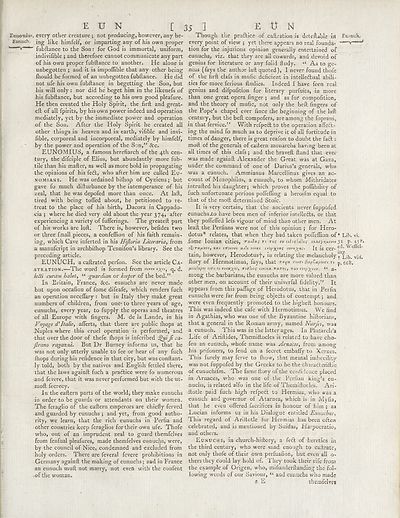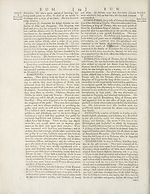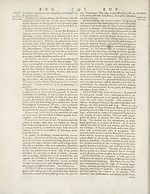Encyclopaedia Britannica > Volume 7, ETM-GOA
(47) Page 35
Download files
Complete book:
Individual page:
Thumbnail gallery: Grid view | List view

E U N C 35 1 E tl M
Eunomius, every other creature ; not producing, however, any be-
Eunuch. ing like himfelf, or imparting any of his own proper
fubftance to the Son? for God is immortal, uniform,
indivifible ; and therefore cannot communicate any part
of his own proper fubftance to another. He alone is
unbegotten ; and it is impoffible that any other being
fliould be formed of an unbegotten fubftance. He did
not ufe his own fubftance in begetting the Son, but
his will only : nor did he beget him in the likenefs of
his fubftance, but according to his own good pleafure.
He then created the Holy Spirit, the firft and great-
eft of all fpirits, by his own power indeed and operation
mediately, yet by the immediate power and operation
of the Son. After the Holy Spirit he created all
other things in heaven and in earth, vifible and invi-
fible, corporeal and incorporeal, mediately by himfelf,
by the power and operation of the Son,” &c.
EUNOMIUS, a famous herefiarch of the 4th cen¬
tury, the difciple of Elius, but abundantly more fub-
tile than his mafter, as well as more bold in propagating
the opinions of his fedl, who after him are called Eu-
nomians. He was ordained bifliop of Cyzicus; but
gave fo much difturbance by the intemperance of his
zeal, that he was depofed more than once. At laft,
tired with being tofled about, he petitioned to re¬
treat to the place of his birth, Dacora in Cappado¬
cia ; where he died very old about the year 374, after
experiencing a variety of fufferings. The greateft part
of his works are loft. There is, however, befides two
or three fmall pieces, a confeffion of his faith remain¬
ing, which Cave inferted in his Hijloria Literaria, from
a manufcript in archbilhop Tennifon’s library. See the
preceding article.
EUNUCH, a caftrated perfon. See the article Ca¬
stration.—The word is formed from q. d.
kQi curam babet, “ guardian or keeper of the bed.”
In Britain, France, &c. eunuchs are never made
but upon occafion of fome difeafe, which renders fuch
an operation neceffary : but in Italy they make great
numbers of children, from one* to three years of age,
eunuchs, every year, to fupply the operas and theatres
of all Europe with fingers. M. de la Lande, in his
Voyage d’Italic, aflerts, that there are public fhops at
Naples where this cruel operation is performed, and
that over the door of thefe (hops is infcribed $>u\fi ca-
Jlrano ragazzi. But Dr Burney informs us, that he
was not only utterly unable to fee or hear of any fuch
ftiops during his refidence in that city, but was conftant-
ly told, both by the natives and Engliih fettled there,
that the laws againft fuch a praftice were fo numerous
and fevere, that it was never performed but with the ut-
moft fecrecy.
In the eaftern parts of the world, they make eunuchs
in order to be guards or attendants on their women.
The feraglio of the eaftern emperors are chiefly ferved
and guarded by eunuchs ; and yet, from good autho¬
rity, we learn, that the rich eunuchs in Perfia and
other couatries keep feraglios for their own ufe. Thofe
who, out of an imprudent zeal to guard themfelves
from fenfual pleafures, made themfelves eunuchs, were,
by the council of Nice, condemned and excluded from
holy orders. There are feveral fevere prohibitions in
Germany againft the making of eunuchs; and in France
an eunuch muft not marry, not evert with the confent
of the woman.
Though the pra&ice- of caftration is deteftable lit Eunuch,
every point of view ; yet there appears no real founda- ~
tion for the injurious opinion generally entertained of
eunuchs, viz. that they are all cowards, and devoid of
genius for literature or any folid ftudy. “ As to ge¬
nius (fays the author laft quoted), I never found thofe
of the firft clafs in mufic deficient in intelle&ual abili¬
ties for more ferious ftudies. Indeed I have feen real
genius and difpofition for literary purfuits, in more
than one great opera finger ; and as for compofition,
and the theory of mufic, not only the beft fingers of
the Pope’s chapel ever fince the beginning of the laft
century, but the beft compofers, are among the foprani,
in that fervice.” With refpetlto the operation affect¬
ing the mind fo much as to deprive it of all fortitude in
times of danger, there is great reafon to doubt the faft :
moft of the generals of eaftern monarchs having been at
all times of this clafs; and the braveft ftand that ever
was made againft Alexander the Great was at Gaza,
under the command of one of Darius’s generals, who
was a eunuch. Ammianus Marcellinus gives an ac¬
count of Menophilus, a eunuch, to whom Mithridates
intrufted his daughter; which proves the pofiibility of
fuch unfortunate perfons pofieffing a heroifm equal to
that of the moft determined Stoic.
It is very certain, that the ancients never fuppofed
eunuchsOxi have been men of inferior intelleits, or that
they pofleffed lefs vigour of mind than other men. At
leaft the Perfians were not of this opinion ; for Hero¬
dotus* relates, that when they had taken poffeffion of * Lib. vi.
fome Ionian cities, xxiSct; ti tv; iv itSia-UU; (v.KvyO'U.ivoi 3* p. 45r^
£§ST«/4»0V, XHI ITOUVV Unit linctl tvopxta; SUVH^Vi-. It is cer„ e<L Weffel-
tain, however, Herodotusf, in relating the melancholy1"!^ viii.
ftory of Hermotimus, fays, that rota-t liupSupnet n p_ 6^8.
fiuultpot 110-1,11 tui/vgol, mirlto; nvsxx Tuot,;, rav tvopgitiv, “ a-
mong the barbarians, the eunuchs are more valued than
other men, on account of their univerfal fidelity.” It
appears from this paffage of Herodotus, that in Perfia
eunuchs were far from being objects of contempt; and
were even frequently promoted to the higheft honours.
This was indeed the cafe with Hermotimus. We find
in Agathias, who was one of the Byzantine hiftorians,
that a general in the Roman army, named Narfes, was
a eunuch. This was in the latter ages. In Plutarch’s
Life of Ariftides, Themiftocles is related to have cho-
fen an eunuch, whofe name was Arnac.es, from among
his prifoners, to fend on a fecret embaffy to Xerxes.
This furely may ferve to fliow, that mental imbecility
was not fuppofed by the Greeks to be the charaCteriftie
of eunuchifm. The fame ftory of the confidence placed
in Arnaces, who was one of the Perfian king’s eu¬
nuchs, is related alfo in the life of Themiftocles. Ari-
ftotle paid fuch high refpedt to Hermias, who was a
eunuch and governor of Atarnea, which is in Myfia,
that he even offered facrifices in honour of him ; a*
Lucian informs us in his Dialogue entitled Eunuchus,
This regard of Ariftotle for Hermias has been often
celebrated, and is mentioned by Suidas, Harpocratio,
and others.
Eunuchs, in church-hiftory, a fed of heretics in
the third century, who were mad enough to caftrate,
not only thofe of their own perfuafion, but even all o-
thersthey could lay hold of. They took their rife from
the example of Origen, who, mifunderftanding the fol¬
lowing words of our Saviour, “ and eunuchs who made
2 E themfelve*
Eunomius, every other creature ; not producing, however, any be-
Eunuch. ing like himfelf, or imparting any of his own proper
fubftance to the Son? for God is immortal, uniform,
indivifible ; and therefore cannot communicate any part
of his own proper fubftance to another. He alone is
unbegotten ; and it is impoffible that any other being
fliould be formed of an unbegotten fubftance. He did
not ufe his own fubftance in begetting the Son, but
his will only : nor did he beget him in the likenefs of
his fubftance, but according to his own good pleafure.
He then created the Holy Spirit, the firft and great-
eft of all fpirits, by his own power indeed and operation
mediately, yet by the immediate power and operation
of the Son. After the Holy Spirit he created all
other things in heaven and in earth, vifible and invi-
fible, corporeal and incorporeal, mediately by himfelf,
by the power and operation of the Son,” &c.
EUNOMIUS, a famous herefiarch of the 4th cen¬
tury, the difciple of Elius, but abundantly more fub-
tile than his mafter, as well as more bold in propagating
the opinions of his fedl, who after him are called Eu-
nomians. He was ordained bifliop of Cyzicus; but
gave fo much difturbance by the intemperance of his
zeal, that he was depofed more than once. At laft,
tired with being tofled about, he petitioned to re¬
treat to the place of his birth, Dacora in Cappado¬
cia ; where he died very old about the year 374, after
experiencing a variety of fufferings. The greateft part
of his works are loft. There is, however, befides two
or three fmall pieces, a confeffion of his faith remain¬
ing, which Cave inferted in his Hijloria Literaria, from
a manufcript in archbilhop Tennifon’s library. See the
preceding article.
EUNUCH, a caftrated perfon. See the article Ca¬
stration.—The word is formed from q. d.
kQi curam babet, “ guardian or keeper of the bed.”
In Britain, France, &c. eunuchs are never made
but upon occafion of fome difeafe, which renders fuch
an operation neceffary : but in Italy they make great
numbers of children, from one* to three years of age,
eunuchs, every year, to fupply the operas and theatres
of all Europe with fingers. M. de la Lande, in his
Voyage d’Italic, aflerts, that there are public fhops at
Naples where this cruel operation is performed, and
that over the door of thefe (hops is infcribed $>u\fi ca-
Jlrano ragazzi. But Dr Burney informs us, that he
was not only utterly unable to fee or hear of any fuch
ftiops during his refidence in that city, but was conftant-
ly told, both by the natives and Engliih fettled there,
that the laws againft fuch a praftice were fo numerous
and fevere, that it was never performed but with the ut-
moft fecrecy.
In the eaftern parts of the world, they make eunuchs
in order to be guards or attendants on their women.
The feraglio of the eaftern emperors are chiefly ferved
and guarded by eunuchs ; and yet, from good autho¬
rity, we learn, that the rich eunuchs in Perfia and
other couatries keep feraglios for their own ufe. Thofe
who, out of an imprudent zeal to guard themfelves
from fenfual pleafures, made themfelves eunuchs, were,
by the council of Nice, condemned and excluded from
holy orders. There are feveral fevere prohibitions in
Germany againft the making of eunuchs; and in France
an eunuch muft not marry, not evert with the confent
of the woman.
Though the pra&ice- of caftration is deteftable lit Eunuch,
every point of view ; yet there appears no real founda- ~
tion for the injurious opinion generally entertained of
eunuchs, viz. that they are all cowards, and devoid of
genius for literature or any folid ftudy. “ As to ge¬
nius (fays the author laft quoted), I never found thofe
of the firft clafs in mufic deficient in intelle&ual abili¬
ties for more ferious ftudies. Indeed I have feen real
genius and difpofition for literary purfuits, in more
than one great opera finger ; and as for compofition,
and the theory of mufic, not only the beft fingers of
the Pope’s chapel ever fince the beginning of the laft
century, but the beft compofers, are among the foprani,
in that fervice.” With refpetlto the operation affect¬
ing the mind fo much as to deprive it of all fortitude in
times of danger, there is great reafon to doubt the faft :
moft of the generals of eaftern monarchs having been at
all times of this clafs; and the braveft ftand that ever
was made againft Alexander the Great was at Gaza,
under the command of one of Darius’s generals, who
was a eunuch. Ammianus Marcellinus gives an ac¬
count of Menophilus, a eunuch, to whom Mithridates
intrufted his daughter; which proves the pofiibility of
fuch unfortunate perfons pofieffing a heroifm equal to
that of the moft determined Stoic.
It is very certain, that the ancients never fuppofed
eunuchsOxi have been men of inferior intelleits, or that
they pofleffed lefs vigour of mind than other men. At
leaft the Perfians were not of this opinion ; for Hero¬
dotus* relates, that when they had taken poffeffion of * Lib. vi.
fome Ionian cities, xxiSct; ti tv; iv itSia-UU; (v.KvyO'U.ivoi 3* p. 45r^
£§ST«/4»0V, XHI ITOUVV Unit linctl tvopxta; SUVH^Vi-. It is cer„ e<L Weffel-
tain, however, Herodotusf, in relating the melancholy1"!^ viii.
ftory of Hermotimus, fays, that rota-t liupSupnet n p_ 6^8.
fiuultpot 110-1,11 tui/vgol, mirlto; nvsxx Tuot,;, rav tvopgitiv, “ a-
mong the barbarians, the eunuchs are more valued than
other men, on account of their univerfal fidelity.” It
appears from this paffage of Herodotus, that in Perfia
eunuchs were far from being objects of contempt; and
were even frequently promoted to the higheft honours.
This was indeed the cafe with Hermotimus. We find
in Agathias, who was one of the Byzantine hiftorians,
that a general in the Roman army, named Narfes, was
a eunuch. This was in the latter ages. In Plutarch’s
Life of Ariftides, Themiftocles is related to have cho-
fen an eunuch, whofe name was Arnac.es, from among
his prifoners, to fend on a fecret embaffy to Xerxes.
This furely may ferve to fliow, that mental imbecility
was not fuppofed by the Greeks to be the charaCteriftie
of eunuchifm. The fame ftory of the confidence placed
in Arnaces, who was one of the Perfian king’s eu¬
nuchs, is related alfo in the life of Themiftocles. Ari-
ftotle paid fuch high refpedt to Hermias, who was a
eunuch and governor of Atarnea, which is in Myfia,
that he even offered facrifices in honour of him ; a*
Lucian informs us in his Dialogue entitled Eunuchus,
This regard of Ariftotle for Hermias has been often
celebrated, and is mentioned by Suidas, Harpocratio,
and others.
Eunuchs, in church-hiftory, a fed of heretics in
the third century, who were mad enough to caftrate,
not only thofe of their own perfuafion, but even all o-
thersthey could lay hold of. They took their rife from
the example of Origen, who, mifunderftanding the fol¬
lowing words of our Saviour, “ and eunuchs who made
2 E themfelve*
Set display mode to:
![]() Universal Viewer |
Universal Viewer | ![]() Mirador |
Large image | Transcription
Mirador |
Large image | Transcription
Images and transcriptions on this page, including medium image downloads, may be used under the Creative Commons Attribution 4.0 International Licence unless otherwise stated. ![]()
| Encyclopaedia Britannica > Encyclopaedia Britannica > Volume 7, ETM-GOA > (47) Page 35 |
|---|
| Permanent URL | https://digital.nls.uk/189121840 |
|---|
| Attribution and copyright: |
|
|---|
| Description | Ten editions of 'Encyclopaedia Britannica', issued from 1768-1903, in 231 volumes. Originally issued in 100 weekly parts (3 volumes) between 1768 and 1771 by publishers: Colin Macfarquhar and Andrew Bell (Edinburgh); editor: William Smellie: engraver: Andrew Bell. Expanded editions in the 19th century featured more volumes and contributions from leading experts in their fields. Managed and published in Edinburgh up to the 9th edition (25 volumes, from 1875-1889); the 10th edition (1902-1903) re-issued the 9th edition, with 11 supplementary volumes. |
|---|---|
| Additional NLS resources: |
|

